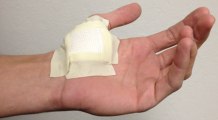 As a disability lawyer, I get many calls from my Nebraska neighbors asking if their impairment will qualify them for Social Security Disability benefits. If you have a skin disorder and you are unable to work, you may qualify for benefits. Skin disorders that result from hereditary, congenital, or acquired pathological processes are identified in Section 8.00 of the SSA listing of impairments.
As a disability lawyer, I get many calls from my Nebraska neighbors asking if their impairment will qualify them for Social Security Disability benefits. If you have a skin disorder and you are unable to work, you may qualify for benefits. Skin disorders that result from hereditary, congenital, or acquired pathological processes are identified in Section 8.00 of the SSA listing of impairments.
The following Skin Disorders are included in this category and may meet the SSA disability guidelines:
- Ichthyosis
- Bullous disease
- Chronic infections of the skin or mucous membranes
- Dermatitis
- Hidradenitis Suppurativa
- Genetic photosensitivity disorders
- Burns
Do not be discouraged if your condition does not meet the SSA listing. If you continue the claims process, your claim will still be evaluated by the SSA. Your limitations and symptoms may affect your ability to work without specifically meeting the listing. The SSA wants to determine if you can perform your past relevant job(s), or if there are other jobs you have the ability to perform. Many of my Nebraska clients with a skin disorder complain that they are unable to work because they have lesions that are painful and require extensive treatment. Furthermore, your condition may cause anxiety and make it difficult for you to interact with others. Your skin disorder can easily affect your activities of daily living and make it difficult to maintain a job.
Skin disorders can be a tricky issue for Social Security Disability if you have any questions about the skin disorders or any other questions about the Social Security Disability processes please call Attorney Patrick B. Cavanaugh at 1-800-342-3352 for a free consultation.
The Social Security Administration will need medical documentation from “acceptable medical sources” to evaluate the presence and severity of your disorder. Information commonly needed for a skin disorder disability claim is; the onset date, duration and prognosis, frequency of flare-ups, location, size and appearance. To confirm a diagnosis the SSA may need laboratory findings such as biopsy and blood tests results. Your symptoms (including pain) will be assessed to determine how they impact your daily life and your ability to work. The effects of any treatment you receive to include medication, therapy and surgery will be assessed. This information is useful in determining the severity of your impairment. Your skin disorder may respond well to treatment, however the side effects can result in limitations. Any adverse effects of the treatment will be assessed.
